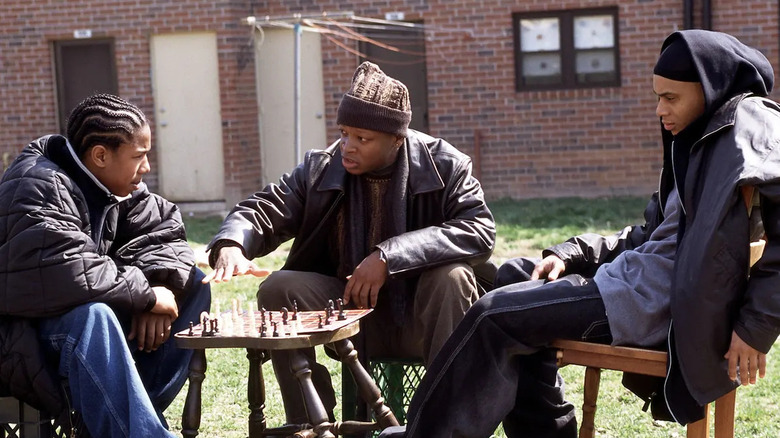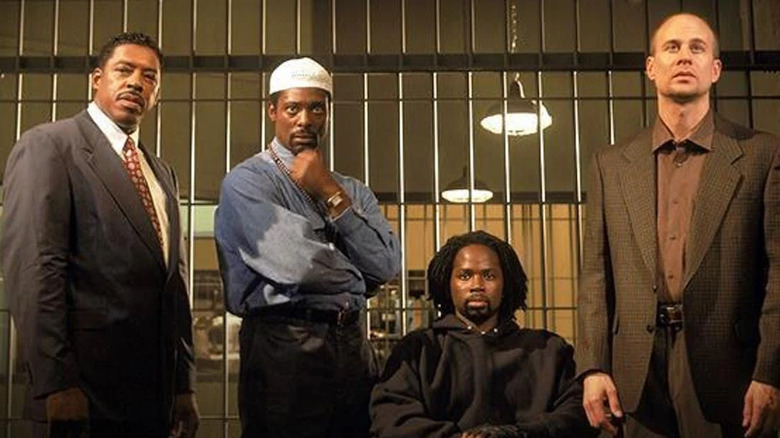
Two decades beyond its pilot episode, HBO crime drama "The Wire" signaled a creative upheaval in cable TV. Called the great American novel put on screen by some and a Greek tragedy writ large by others, the show explored, in uncommon depth, the social and political nuances of the failed "war on drugs" that had been chugging along since 1971. Focused on an array of Baltimore characters and unpacking a different institution over each of its five seasons, creator David Simon and a formidable team of writers defied the neatly enclosed constraints of episodic television and proved viewers can immerse and invest themselves into a cumulative narrative that builds upon the last. It's a conceit that found success with concurrent HBO series like "The Sopranos" and "Oz," the latter of which had a greater influence on "The Wire" than anyone knew.
In a 20th anniversary interview with the New York Times, Simon went long on the series and its (unfortunately) lasting relevance, giving credit to Tom Fontana's prison series, the first hourlong drama produced by the American network in 1997:
"Nothing's in a vacuum. I would credit 'Oz' for showing me that there was this network out there that would tell a dark story and tell an adult story. 'Homicide' [Simon's first book] had been made into a TV show. But with 'The Corner' [Burns and Simon's nonfiction book centered on a West Baltimore drug market], I was like: 'The rights are worth nothing. Nobody's going to put that on American television.' And then I saw 'Oz,' and so that was the moment where I looked at HBO and said, 'Oh, would you like to make a mini-series about a drug-saturated neighborhood and about the drug war?'"
We're Not In Kansas Anymore

Named for the fictional state correctional facility where its principals reside, "Oz" follows the small triumphs and grave tragedies surrounding the men of a maximum-security prison. It's not just the inmates (who split into factions, like the makeup of any prison); optimistic unit managers, a retributive warden, and correctional guards all interact like proton beams in a particle collider, all coming together under the Greek choral narration of inmate Augustus Hill (Harold Perrineau). Using its position on a premium cable network, the series created by Tom Fontana (who also executive produced NBC's "Homicide" series) features rougher elements or components too spicy for traditional broadcast TV, from strong language to male-on-male rape and frontal nudity. Beyond that, the show offers what Alan Sepinwall calls "the first revolutionary cable drama of the period" that opened the door for the prestige TV that followed.
Sepinwall's book "The Revolution Was Televised" highlights what a shake-up the series was for HBO executives like Carolyn Strauss and Chris Albrecht (between the two were show commissions for "The Sopranos," "Six Feet Under," "Sex and the City," and "Deadwood," among other notables). Top brass loved the very things that had the broadcast networks clutching their pearls — with few heroes, fewer victories, and a whole lot of storytelling rules going right out the window.
David Simon, fresh off the writing staff of "Homicide: Life on the Streets" (based on his bestselling book), got a look at the "Oz" pilot and saw the potential for a sprawling narrative that pulled no punches. He's quoted in Sepinwall's book:
"I'm watching that initial pilot and thinking, 'This is going on television? HBO's going to do stuff like this? I'll be godd*****.'"
Finally, Simon found, there was a home for a story that could (and is) so much more than the old cops-and-criminals narrative.
Read this next: The 18 Best Crime Dramas In TV History
The post One Series Showed David Simon That TV Was Ready For The Wire appeared first on /Film.
0 Commentaires